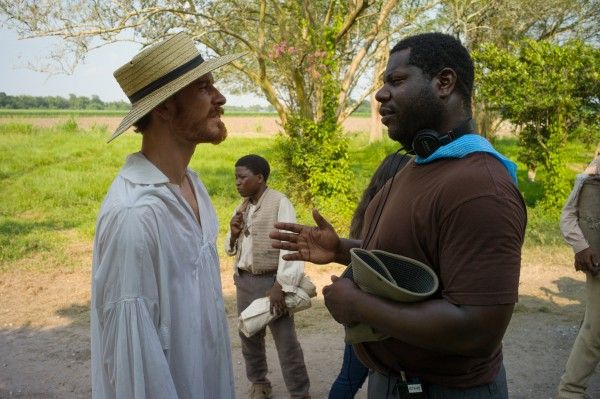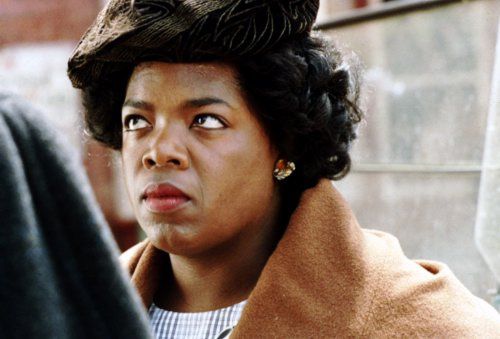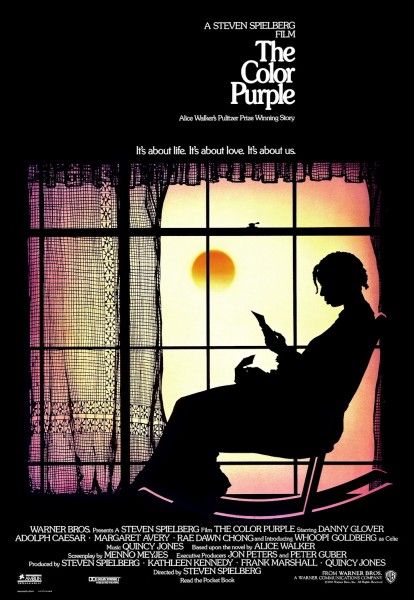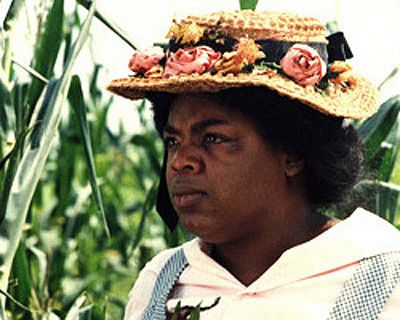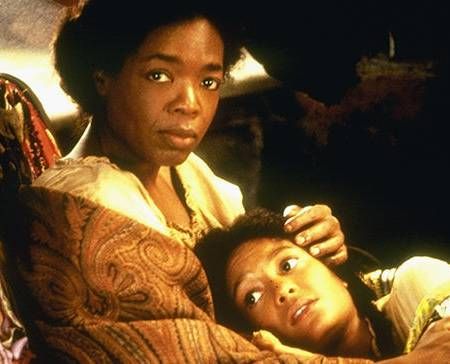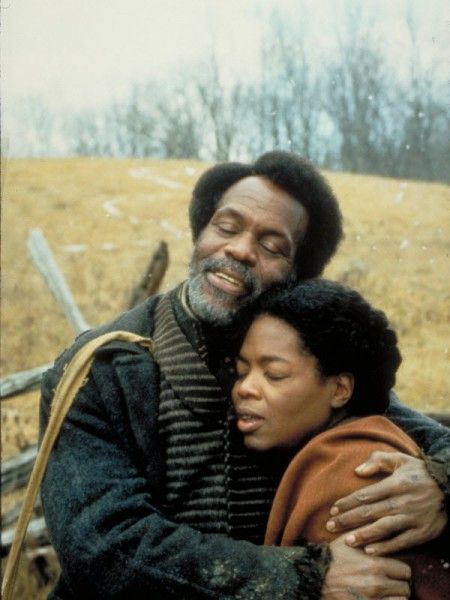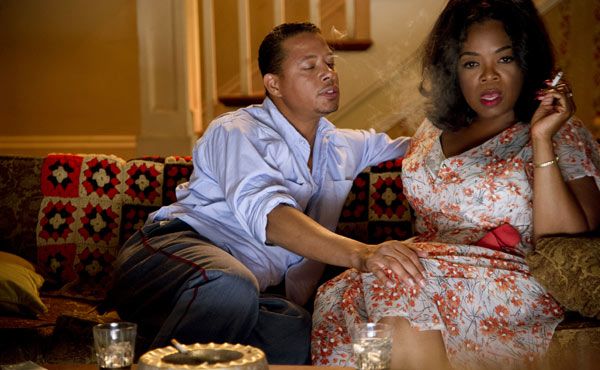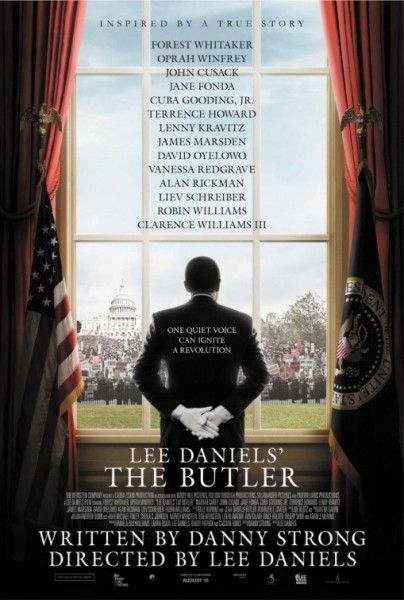Drawing a fully packed house, the 29th Santa Barbara International Film Festival (SBIFF) presented the prestigious Montecito Award to hometown girl Oprah Winfrey this year, on behalf of her inspirational performance in Lee Daniels' The Butler and as a celebration of her overall career. Collider was there to cover and attend the event, and we’ve compiled the highlights of what she had to say during the Q&A.
While there, Oprah Winfrey, also known as the Queen of All Media, talked about being honored by the town she now resides in, how her experience on The Color Purple changed her life, why it had such deep meaning for her, her crazy journey to get that role, learning how to give herself over to a character, what made you want to get into producing, the disappointment she experienced with Beloved, wanting to only take acting roles in stories that having meaning and matter to her, why she felt she was poorly cast as the voice of Mother Goose in Charlotte’s Web, why she refused to do Prisoners, what made her say yes to The Butler, the types of roles she won’t do, and that she thinks she will do more films. Check out what she had to say after the jump.
Question: How does it feel to be here tonight, in your hometown?
OPRAH WINFREY: Can I just tell you the truth? I get asked to do a lot of stuff. And all of the years that people have asked me to do things for the film festival, I couldn’t because I had that day job in Chicago. And so this year, I thought, “Oh, my god, I don’t have a day job. If somebody ask me to do something, I’m going to do it.” If thought it was going to be introducing Forest [Whitaker] for his award. I didn’t know that I was going to be sitting here, reviewing my life’s work. I talked to Gail, my best friend, on the phone this afternoon. She said, “Are you getting some award?” And I said, “Not just some award. I’m getting the Montecito Award.” She said, “What for?” And I said, “It’s for my body of work.” And she said, “On the Oprah show?” And I said, “No, it’s for my body of film work.” She didn’t just LOL. She started howling and dropped the phone.
Gail said, “I think that’s a big stretch, your body of work.” So, I think it really is because I have friends who like me in this town. Thank you. I mean, come on! Seriously, when they said that I was going to be interviewed for my body of work, I thought it would be for 10 minutes. We know that people in Santa Barbara like to be home by 9:30, so we can get them out of here and get them home on time. So listen, I am under no illusion, that I have a body of work. I was like, “Do they know I’ve done three films?” Now, I’ve done 4,694 Oprah shows. I can talk about that, all day long. So, I appreciate you all coming out. You all could have just come to my house, really. It’s nice seeing all my friends here and having you show up. I really appreciate it, and I understand that it’s because I’m the hometown girl.
It’s not about the volume. It’s about the quality.
WINFREY: Okay. Well, that’s true. I would have to say, this is a great year for quality.
This seems to be a landmark year for stories about African Americans, and for work by black filmmakers.
WINFREY: You know, I had a conversation with Spike Lee about this for an interview that I did on OWN, and he was saying that every five to ten years or so, people talk about this abundance of black films, and then it goes away. I was really, really excited about 12 Years a Slave. It was very hard for me to watch. I don’t know about how it was for all you white people, but it was very hard for me, and I mean that, seriously. I think it’s phenomenal that they were able to capture the essence of that story, in a way that entertained people enough to stay in the seats, and also inform them. I think it speaks to the progression of all of us, as a culture, and I’m really excited for what will happen at the Oscars with the film. I’m really hoping that it wins Best Picture.
If Steve McQueen wins Best Director, he’ll be the first black man ever to win that Oscar, and it’s about time.
WINFREY: Yeah, that would be fantastic. I can honestly say that I’m not a person who thinks about awards, as much I think about the work itself. I think the fact that it has had the kind of notoriety and response from the audience is the most important thing. So if it wins, that’s fantastic. If it doesn’t, that is also okay. The fact that we are now open to hear other people’s stories, and stories from all cultures, particularly, African Americans, really excites me.
The Butler not only did incredibly well here, but it also went overseas and did business, even though people say that no one outside these borders is going to go see a movie with a black cast.
WINFREY: You know, that is what they say. They always say that it’s not going to do well. So, the fact that I think it did $40 million internationally, and that we were able to pass the $100 million mark here in the United States is extraordinary. And that was opening in August.
And it was the movie that everybody refused to make.
WINFREY: For a long time, yes.
You’ve said that your experience on The Color Purple changed your life. Why did it have such deep meaning for you?
WINFREY: The Color Purple was a seminal moment in my life. I read the book when it came out. The first thing I would do on Sundays in 1983, when the book first came out, is the same thing that I do now. I would get the New York Times and read the book section. Now that I’m in Los Angeles, it’s the L.A. Times, but I was in Baltimore, so it was New York Times. So, I got the book section and I read this review of Alice Walker’s book, The Color Purple. I was in my pajamas, and I put my coat on, over my pajamas, and went to the book store. I got the book and read it, in one day. And then, I went back, the next day, and bought every copy they had. I would hand the book out to everybody that I knew. I passed it around to everybody in the office. I became obsessed with the book. I moved to Chicago and I would literally walk around with a backpack filled with books because I didn’t have a book club, and I would just start a conversation with people and say, “Have you read The Color Purple?” And if they hadn’t, I’d say, “Here, have a copy, right here.” I was literally obsessed with it.
Then, I heard they were going to do a movie. People were saying, “Somebody’s going to make a movie about that.” And I say, “God, you’ve got to get me in that movie.” Now, I had never been in a movie. I didn’t know anything about movies. But, I started praying to be in the movie. I was going to try to get in that movie. So, Quincy Jones came to Chicago because he was producer of the Thriller album and there was a lawsuit being filed against Michael Jackson. Somebody said that Billie Jean was their lover, and that he stole it, or whatever. So, Quincy Jones was there to prove that Billie Jean was not their lover. He had taken a red eye and he was getting out of the shower, and he turned on the TV in his hotel room. I was on AM Chicago and Quincy Jones saw me on that, and he said, “That’s Sofia.”
Now, I didn’t know that, but he called his casting agent and I auditioned for The Color Purple. But, they weren’t calling it The Color Purple. They called it Moon Song because they were all very secretive. So, I got a call saying, “Would you like to come and audition for a movie called Moon Song?” And I said to the guy, “Are you sure it’s not The Color Purple?” I had not been praying for Moon Song. I had been praying for The Color Purple. I knew the whole book, so when I got to the audition and I read [the sides], I was like, “This is The Color Purple!” It is amazing that I attracted this into my life. It was a miracle. So, I auditioned for The Color Purple, but I didn’t hear anything. Two months passed, which was a bad sign. And so, I called up the casting director, Reuben Cannon, and I said, “I haven’t heard from you.” And he said, “You don’t call us. We call you. What are you doing calling me? Do you realize that I have real actresses who auditioned for this role?” Now that I’ve become Oprah Winfrey, he denies that. But, he said that and he hurt my feelings, and I got off the phone and cried. He said, “Do you know who just left my office? Alfre Woodard.” And I said, “Okay, thank you, sir,” and got off the phone. I was crying because I knew I was not going to get the part because Alfre Woodard is a real actress, and I was not.
So, I decided that it was because I’m fat, and that finally the fatness caught up with me. I went to a fat farm in Wisconsin, and I was going to try to eliminate some of my weight problem. I had gone on The Tonight Show and Joan Rivers said to me, “You’re fat. You need to lose some weight.” I said, “Yes.” She said, “Why do you eat so much?” I said, “I like potato chips, Joan.” No kidding. That’s all true. So, I made this bet with Joan Rivers that I was going to lose 15 pounds, and then come back on the show. It was my first time on The Tonight Show. So, when I made the bet, I did what everybody does when you make a bet that you’re going to lose weight, which is that you have to have your last meal. I had my last meal for a couple of weeks. I had to get it out of my system. So, by the time I decided to go to the fat farm, I now haven’t lost that 15 pounds, but I’ve gained 12. I went to the fat farm to have a talk with myself and God, literally. I said, “God, I can’t believe you let me come this close. I’ve been praying for a year for this. But if I’m not to get it, then you have to help me let it go because I’ve become obsessed with it. I’m getting on people’s nerves. Help me let it go.”
So, I start running around the track, and there was this song, “I Surrender All.” I start singing that song to help me let it go. I was singing and praying and crying to let it go. And it was not just to let it go, but to let it go to the point where, when I go to the movie, I can see Alfre Woodard in that part and not be sick. I wanted to be able to release it and go on with my life. The fact that when I did the audition, the character that I was auditioning with was named Harpo, which I thought was a sign from Jesus. It was my name on the page, spelled backwards. So, I was on the track, praying and crying. I just wanted to pray until it was released and I was going to be all right. The instant I got to, “I’m going to be all right. I can go to the movie. I can see Alfre Woodard in that part. It’s okay. I will live. I will go on with my life,” a woman came running out. She said, “There’s a phone call for you. He says he’s Steven Spielberg.” I get on the phone and Steven Spielberg said, “I hear you’re at a fat farm.” I say, “No, sir, this is a health retreat.” Steven Spielberg said to me, “I would like to see you in my office at Amblin tomorrow.” I didn’t even know what that was. He said, “If you lose a pound, you could lose this part.” Honey, I packed my bags in seven minutes, and I stopped at the Dairy Queen. I got myself three scoops, just in case I lost a pound, and I went to that audition.
So, The Color Purple changed my life. It changed everything about my life because, in that moment of praying and letting go, I really understood the principle of surrender. The principle of surrender is that, after you have done all that you can do, and you’ve done your best and given it your all, you then have to release it to whatever you call God, or don’t call God. It doesn’t matter because God doesn’t care about a name. You just release it to that which is greater than yourself, and whatever is supposed to happen, happens. And I have used that principle about a million times now. You release it to Grace. So, when you see me in this movie, I had never been happier in my life. It is the reason why I ended up owning my own show. At the time, I only had two weeks vacation. I was doing 220 shows a year, and I only had two weeks for vacation. But, I needed two months to film The Color Purple and my bosses were like, “Get your ass back here because AM Chicago is what’s important. That’s what you signed up for.” And I was like, “Please just let me have two more weeks.”
So, I gave up all of the vacation weeks in my contract, in order to be able to do that movie. I said, “Okay, I won’t take a vacation for the next five years, if you just let me finish this movie.” And when AM Chicago became successful, in less than six months, people started calling it The Oprah show. My attorney, at the time, said, “You never, ever want to be in a position again where you can’t do something because somebody is telling you no. When we renegotiate this thing, you should own it.” That happened because of The Color Purple. And I hadn’t even had an acting lesson. I didn’t know what acting was.
So much of your life’s work is about finding and becoming your authentic self, and yet so much of acting is hiding that authentic self and becoming somebody else. What was that transition like for you?
WINFREY: Well, when I did The Color Purple, I was just so excited about being a part of it and having that story told. I literally was at my motel room with acting books. I had the Stanislavski, How to Act book because, instinctively, I was thrown by the word acting. I know you’ve got to figure out a way to tell the truth, but how do you tell the truth and act? So, I was trying to read up on it. And Steven had asked me to cry in a scene. I was on the set, every single day, whether I was shooting or not, because I was just so happy to be there and to learn what I could. I was crying over a scene, one day, and Steven said, “I’m going to turn the camera around this afternoon and I want you to do that.” I said, “Do what?” And he said, “What you’re doing now. I want you to cry.” I was watching Harpo in a scene, and he was going to shoot my reversal of that scene. Well, I didn’t know how I had just done that. I was just crying because I was watching it. So, when he asked me to cry, I could hear the film moving in the camera and I was trying. I was thinking of my dog that died. I did not have the skills to bring the tears. I remember taking salt in my hand and trying to put it in my eyes.
That night, I was in my motel room and I was crying against the wall, just sobbing because I couldn’t cry when Steven had asked me to cry. I thought he was going to throw me out of the movie. I had to learn how to give myself over to the character and let the character take control. Acting is finding a way to give yourself over. You have to use your body as a vehicle. I was looking for that in the pages of the Stanislavski books, but never finding it. I had to surrender. I knew the character so well. I had a journal for the character. I had based her on my aunt and my grandmother, and people that I knew. I could tell you her favorite color, and it wasn’t purple. So, I knew everything about the character. I’d done all of that work. But, the thing that is required to give yourself over to surrender and become a vehicle, so that the spirit and the energy of whatever that is meets you someplace inside hadn’t happened until that scene at the table.
Why didn’t Alfre Woodard get your part? Did you ever ask?
WINFREY: No, I never asked. And until tonight, I never even said it out loud.
It was right around the time of Native Son that you started becoming more active in producing your own material. Was that intentional, on your part, to try to find roles that you could play, or did you just feel that you could help bring stories forward?
WINFREY: Well, it was more about me trying to bring stories forward that weren’t being told. So, I delved into a television series for awhile, with The Women of Brewster Place. I actually thought that I could film a dramatic weekly series, and do that daily show. I nearly died. I just realized that the work of the show, and my intention behind doing the show every day, was to be a light in people’s lives and be able to bring information in such a way that they could be lifted by that. It just consumed so much of my life and time that I learned that I wasn’t going to be able to do both.
Do you think that creative entertainment, film and books have a way of transporting an audience, in a way that the talk show couldn’t, and do you see them as a complement to what you were doing?
WINFREY: I see all art as a complement to telling people’s stories. I’m in the storytelling business. I believe that the humanity that all of us share is the stories of our lives, and everybody has a story. Your story is as important as the next person’s story. I realized, from the time that I was a little girl, that my role is to inspire, encourage and uplift. I’ve been doing that since I was three years old, really. I want to let people see the light inside themselves. There are some people that I raised on the show, who came home and watched with their mothers. All those years, that’s what I was trying to do, through my work and through the books that I highlighted. Discovering that my love of books could also be shared by millions of other people was an exciting adventure for us. To be able to bring people to reading, in such a way, was really exciting.
You read Toni Morrison’s Beloved very early on, correct?
WINFREY: Yeah, right around the time it came out, and before I had a book club. Not only would I carry books and hand them out to people, but I would call up the authors because, back in the day, there was such a thing as the phone book and a lot of authors would have their names listed. Toni Morrison was not listed because she was kind of famous, but a lot of other authors were. So, I ended up calling the fire department in her town and telling then a story. I told a small fib and got somebody to call her and let her know that I was trying to call her. I got the number and I called her. After you finish a book, you just want to talk to somebody about it, and I always think, “No better person to talk to than the person who wrote it.” So, I called Toni Morrison and I said, “Miss Morrison, I just finished reading Beloved and I just want to know if people tell you that they have to go over the lines, again and again. And she said, “That, my dear, is called reading.” And so, I started talking to her about the rights to the story. She said that she didn’t think it could be made into a movie. But 10 years later, we actually did it.
How do you stick with something that long and not lose faith?
WINFREY: Well, because anybody who has ever done anything knows that, when you believe, it doesn’t matter what other people think. You just have to keep finding a way to align your vision with other people who will receive and accept your vision. And when the time is right, if it is for you, it will show itself, if you believe.
And then, after 10 years of struggling to get the film made, Beloved opened and Bride of Chucky beat it at the box office.
WINFREY: I didn’t know what the hell Bride of Chucky was. And I didn’t know anything about how the movie business worked because I was doing my daily show. I was all excited. I didn’t know that you only had one weekend, and then it’s over. So, it came out on a Friday, and that Saturday morning I got a call and they said, “That’s it.” I got the call at like 8:30 in the morning, and by 10:30, I had my face in a bowl of macaroni and cheese. Literally, I went into a numbing depression about it, and I was like that for a long time. It was 1998 and I remember thinking, “I think I’m depressed, but who can I go see? I’m Oprah Winfrey, and they’ll tell everybody.” I remember saying to myself, “I’m going to pray myself out of it. And if I can’t and I’m not better in a month, then I’m going to try to figure out how I can get myself some help.” I still had to go to work, every day. I was devastated by it.
And I remember saying to a friend of mine, Gary Zukav, who wrote Seat of the Soul, “Gary, I think I’m depressed.” He said, “Why?” I said, “Because I spent 10 years of my life doing this film.” And he said, “Well, what was your intention?” I am a person who lives my life based on intention. I don’t do anything without intention because intention determines the outcome of your life. It’s like cause and effect. If I have a religion, my religion is the third law of motion in physics, which says that for every action, there is an equal and opposite reaction. Well, before there is even an action, there is always an intention behind the action, and that intention is going to determine what the outcome is. I said, “Well, my intention was to create a beautiful film that people will see and know that in spite of what slavery did to people, that those people could still love.” He said, “I felt that.” I said, “Well, I wanted people to feel it.” And he said, “Other people felt it. I went with other people, and they felt it.” I said, “Well, I wanted millions of people to feel it.” He said, “That’s not what you said. That wasn’t your intention. If you wanted millions of people to feel it, you would have done a different kind of film.
That really was my wake-up. I thought, “Yeah, you’re right.” I had the studios saying, “You should cut this. You should cut that. It’s not testing well.” I said, “I don’t care about that. What I care about is honoring the work, and honoring what Toni Morrison put on the page.” But, I would do that differently now because I want millions of people to see it. That would be my intention. I learned, and it was a really expensive mistake.
Did that make you cautious about doing another movie?
WINFREY: Well, it changed everything for me. The truth is that I never wanted anything as much as I wanted The Color Purple. I told God, “If you let me get The Color Purple, I promise I won’t want anything else,” and I have never yearned for something that deeply, where I thought, “If it doesn’t happen, I don’t think I’m going to live.” That surrender thing really changed my life, forever, and how I operate with everything. And with Beloved, I had worked on that for that 10 years. I wasn’t as disappointed as I would have been with The Color Purple, but I decided that until something else comes along that is important for me to tell, I’m not going to give up my energy to it, in the way that I’d given up my energy to that. It was a lesson to manage myself more, in a way where I’m only doing the things that matter.
Why aren’t you more proud of your work in Charlotte’s Web?
WINFREY: I think I was poorly cast, as the goose. I really do. I hate to say it, but I would have been a better cow. I think that the goose needed to be a little rounder and have a bigger chest. The voice didn’t fit. I don’t think it was the best casting. I also couldn’t figure out who Mother Goose was. That was hard. It was not for me. I know there are people who can do it very well, but I don’t think it’s my calling. So, I don’t think it was the best casting.
Then some time passed, until Lee Daniels brought you The Butler.
WINFREY: Well, it took 15 years. That’s because that day job consumed my life. When I left The Oprah show, I said, “This has been the true love of my life,” and that’s the truth. It actually took me a year to separate the show from myself. I made that decision, knowing that it was time. I didn’t want someone taking the microphone out of my hand and saying, “It’s time to go home, honey.” I wanted to end while I still felt like I had something to say, and that it was meaningful to the audience. So, it took a moment for me to say, “That has been my life. Now what is my life? Who am I, separate from that show?”
In between your last role and then The Butler, were there things that you were looking at and considering?
WINFREY: I got a lot of Nobody Knows the Trouble I’ve Seen roles, but there was no reason to do those. I’m turning 60 in a week. What you want to do is to get to the point where you only do what matters to you. The real goal in life is to become more of who you are, so that you can make the choices that really satisfy who you are and what you want to do. And when you get to 60, that’s to the 10th power. You want to make decisions that are meaningful to you, and that are going to continue to enhance you being who you really are and what your message to the world is, and everybody has one. The real important thing is to know what that message is and how you want to carry that forward. That’s what I’m into doing now. I make decisions based upon, what is the message I want to carry forward? What is it that I want to say? Your work speaks for you. Your art defines you.
And so, the decision to do The Butler was in the middle of my climb with OWN. I was in the heat of it. I was launching my network and getting hit, on every end. Every newspaper was calling it, “The struggling OWN network.” I knew that I would come out of it. You have to understand the trajectory of your life. I am a black woman, born in Kosciusko, Mississippi in 1954, when it was an apartheid state. I now have the privilege of living in this magnificent town, doing all of the things that I’ve done. I have faith in a power greater than myself, and I know that trouble doesn’t last always. There’s no reason to have come this far to then fail. There’s no such thing as failure. So, when Lee Daniels called me, I said, “This is an awful time. People are trying to kill me, every night.” He said, “I don’t care about that.” We’d been talking about doing the film for awhile.
Lee had told me that he had tried to get me to do Precious, but I didn’t get the call. And I think Mo’Nique did an amazing job, so I don’t even know if I would have said yes to that, in the middle of the Oprah show. And then, he had asked me to do what is now the movie Prisoners. He wanted me to play the child serial killer. I said, “Lee, do not send me a script like that.” And he said, “Well, I wanted you to do something that nobody would expect Oprah Winfrey to do.” I thought it was long stretch. I said, “Don’t even send me anything kind of like that again. Not only am I not going to do it, you shouldn’t do it either. Your karma is going to change, if you do that.” So, he ended up not doing it, and somebody else ended up doing it.
But when he called me for The Butler, he said, “I’ve written this character for you.” It was not the most opportune time, but I didn’t believe that the trouble was going to last, so I said, “You know, I’m going to do it. And maybe by the time I do it, I won’t be getting the Schadenfreude, every day. Things will be better. And it will give me an opportunity to tell a meaningful story, in a way that allows people, through the entertainment of the film, to at least see the history.” When we screened it, there were some young people there who said to me afterwards, “Did this really happen?” So, I think it’s important for us to tell our stories in such a way that you pass on the legacy and the meaning, and you allow people to see who we are, as a country and as people. That’s why I said yes.
Was it shocking that people didn’t know this part of American history?
WINFREY: No, it wasn’t. It’s just who we are. Is it shocking that it’s very difficult for a news organization to do news in America now? It’s not shocking because we’re a culture that doesn’t want news. We want entertainment. We want info-tainment. That’s why CNN is having problems. They want girls in cocktail dresses, giving them info-tainment. It’s not shocking that we’re not a culture that understands its history, or certainly understands African American history. It wasn’t shocking, at all. That’s why I wanted to tell it.
Did that experience after making a movie after such a long time away from acting, change the way you saw acting? Did it make you want to do it again?
WINFREY: Yes, of course, I do. I think I will do other films. I’m just going to make a choice based upon what is meaningful and what the story is that I want to tell and that I think can add to the light in the world. I have some specific things that I will not do. I won’t kill people. I just have a personal thing about it. I don’t want to have to go to the space where I have to use violence against someone. So, that eliminates a lot of stuff for me. I don’t have anything against anybody else who does it, but for me, life is about energy. I lead my life through intention and service. A wonderful quote that I love by Martin Luther King says, “Not everybody can be famous. But, everybody can be great because greatness is determined by service.” I use my art in the service of what I believe is our greater humanity. So, whenever I find something that can help me do that, that’s what I want to do.

